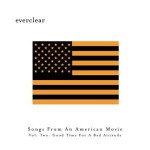 Everclear
Everclear
Songs From An American Movie Vol. 2…
Capitol Records
Everclear’s second installment in the “American Movie” saga, Good Time For A Bad Attitude, maintains the high standards of it’s predecessor, Learning How To Smile, released in July; and adds a rockier edge to the proceedings this time around. What was originally intended to be leader Art Alexakis’ solo escape from the confines of the band, instead has allowed Everclear the opportunity to expand the horizons of the material through more varied presentations.
Alexakis’ songs have always dealt with personal matters in very open, direct and honest ways. This album is no different. A recent divorce and subsequent re-marriage are directly reflected within the dozen songs offered here. In addition, the “ American Movie” series reflects a growing parental instinct made manifest in his daughter Annabella.
“When It All Goes Wrong” takes a somewhat pessimistic stance, churning beneath a familiar Alexakisian guitar riff (think “Santa Monica”) and trademark wails of “yayuh,” waiting for the other shoe to drop— finally squashing his success and happiness once and for all. Similarly, “Slide” bursts forth with cacophonous thunder, detailing a disastrous relationship. Greg Ecklund’s pyrotechnic drumming further amplifies the aura of mass emotional destruction and impending meltdown.
The frenetic riffage of “Babytalk” is something of a departure for Art and crew, churning menacingly, while describing the relationship between Art’s friend Spike and Spike’s manipulative babytalking girlfriend. “A good guy to have in a fight/Unless he was with his girlfriend.”
Though seemingly tongue-in-cheek, “Rock Star” accurately mirrors Art’s own quest for fame and fortune. A rare Alexakis guitar solo dangles in the middle of this number, as does an uncharacteristic key change, a timeworn Pop music device.
“Short Blonde Hair” would seem to portray the other side of the coin in the pursuit of success, the down side: wherein simple goals and desires are transformed under the magnifying glass of public perception. “Yeah, no one really understands/How simple and plain and predictable I am/Coz all I ever wanted to do was play guitar in a rock ‘n’ roll band.” A powerful three-chord phrase punctuates the proceedings with a sense of yearning and despair.
Art’s intricately clever figure on 12-string guitar melts into a fiery electric guitar progression of “Misery Whip,” a volcanically volatile number. “I’m just an actor, like Robert Fucking Redford/ When I say those stupid words that they expect me to say.” Craig Montoya’s juicy basslines help to propel Art’s angular guitar chords.
Acoustic guitars and Beatlesque electric guitar arpeggios support Alexakis’ vocals through the verses of “Out Of My Depth;” spontaneously bursting into flames in the turnarounds before slipping into a spectacularly incandescent chorus. A very original song, both in its structure and in its execution; perhaps the best, or best realized of all Art’s creations. Fabulous!
“The Good Witch Of The North” is an actual ballad from Everclear, write it down. A short and tender love song, it perhaps better echoes the sonic sensibilities of Learning How To Smile , than those presented in this chapter.
But the instrumental “Halloween Americans” resumes the incendiary fireworks, with Ecklund laying down a stilted, syncopated slam rhythm against Montoya’s insistent bass phrases, as Alexakis layers multiple lead guitars into a fiery melange which eventually resolves, in the end into twin electric and acoustic 12-string guitars.
As if throwing gasoline onto a wildfire, the band tears into “All Fucked Up” a blisteringly Grungy anthem to the disenfranchised. Within this tiny withering opus, Alexakis compresses and condenses countless years of Punk frustrations and violence— achieving the fulfillment of Kurt Cobain’s original promise a decade ago.
Faint string filigree hover around “Overwhelming,” and offer a sense of piquant restraint against the aggressive crunch of Art’s guitars. “Song From An American Movie, Pt. 2” is more or less the electrified version of the first song on the previous album, with Art’s English bobbie siren guitar supplanting the original banjo; bringing the entire project full circle. “The only thing that ever made sense in my life/Is the sound of my little girl laughing.”
Where Cobain and Nirvana were reaching a crucial musical dead-end, when Kurt elected to blow his brains out, Art Alexakis chose to record an album such as Learning To Smile. Adhering to his own musical roots, and without sacrificing completely the energy and vitality of Grunge, Art crafted an album that offered to him musical alternatives to the tried-and-true conventions of the style: guitar, bass and drums.
Horn sections, keyboards, acoustic guitars and mandolins, served to expand the band’s horizons. Having assimilated that sense of freedom, with this half of the American Movie project, Art and the band are able to express themselves with newfound vigor and urgency; lending true life and vitality to the old Grunge warhorse.
Beyond that, Alexakis has been able to take his personal musical expression to a far higher level. For, Good Time For A Bad Attitude is the new Everclear album, is the true successor to 1997’s So Much For The Afterglow. This new record takes the band to a wholly new plateau. The possibility exists that Everclear could one day become one of the one of the great Rock bands of all time. Now that would be quite an achievement indeed.
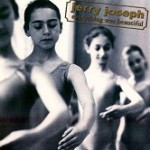 Jerry Joseph
Jerry Joseph
Everything Was Beautiful
Ulftone Music
Jerry Joseph has been plying his craft in Portland since the early ‘90s, when he blew into Portland from the Rocky Mountain region with his Reggae-rooted band Little Women. Jerry quickly made a name for himself around town as a purveyor of hardscrabble Americana Folk songs, with elements of the masters: Dylan, Springsteen, Hiatt, Melancamp and Prine, informing his work.
Joseph himself cites Steve Earle, Chris Whitley, Bob Mould and the Afghan Whigs as influences. He resembles one or all of the above, from time to time, now and then, while maintaining a style of his own as well, both as a soloist and with his band, the Jackmormons. Joseph’s well-publicized victory over drug addiction, in addition to other personal conflicts, have served as rich compost for his artistic endeavors.
This, his tenth recording in all, is an interesting solo project, recorded with longtime friend Pete Drogue producing (as well as adding accompaniment). Droge’s sure hand in the production and Joseph’s lack of vocal affectation, makes of this one of his most direct and personable efforts.
That’s not to say there aren’t a few rough spots. “Joan Of Arc” is pretty terrible. And the album feels about three songs too long. But beyond those small quibbles, there are moments of real grandeur to be found here and found frequently and readily.
Jerrry and Droge do most of the playing here (Droge supplying bass, drums keys, guitars and background vocals where needed), with a revolving cast of side players, including Paul Brainard on pedal steel and lap steel guitars. Elaine Summers on background vocals and percussion, bassist Dave Hull (of Sheryl Crow’s retinue), guitarist Ian Moore, as well as Caleb Klauder, providing key support when needed.
The first track, “Good Sunday,” signals the subtle stylistic departure. Over the programmed snap of a drum machine, Droge’s watery wah-wah electric guitar and buzzing synth lines, as well as a scintillating Wurlitzer piano part, create an austerely pastoral aura. Very nice.
“King Of Love” is a countrified waltz, replete with Brainard’s crying pedal steel and the jangling acoustic and electric guitars of Joseph and Droge. “What I Live For” continues the Country feel, though this one more resembles those of Dylan or Prine.
“Both Of You” again utilizes programmed drums to good effect as Droge and guitarist Peter Stroud join to provide Jerry with a blanket of velvety guitars. Meanwhile Jerry delivers a heartfelt vocal, as leathery and gritty as a hardridden saddle.
Without doubt “1936 Jesus” is one of Joseph’s best songs ever. Combining lines written by novelist Collum McCann with his own, to create a menacing mood, Joseph’s imagery is uncharacteristically visual with this number, possible attributable to McCann’s pen. “See the fires of Wyoming/Hang coyotes from the fence/Heading down to the Teton Flood Museum/To see where the water went.” Joseph’s vocal performance on the song calls to mind some of the more effective work of Lee Hazelwood in the ‘60s. such as “Some Velvet Morning.” Haunting.
“Mary Star Of The Sea” never quite gets off the ground. But “Middle East” benefits from Laynge Martine’s smart drum program and Dave Hull’s jaunty basswork to produce a sensual mood for Jerry’s dusty sandblown vocals. “Mountain Home” makes great use of Ian Moore on digeridu and harmonium as well as dobro and electric guitar, to create another unusual atmosphere. “Joan Arc” is a half-hearted stab at a cocktail bossa nova that just doesn’t fit Jerry very well.
But the Country honky-tonk of “You Again” fits like a rawhide work glove, with Brainard supplying pedal steel, while Droge lays down a punchy drum foundation. And “Altar In Your Box” is a simple arrangement, just a couple of acoustic guitars accompanying Jerry’s solitary vocal. A poignant, well-crafted narrative that might possibly be about the interesting home-made monument that sits off the I-5 freeway outside of Weed on the side of Mt. Shasta— that’s one interpretation anyway; the song is another great example of the new Jerry Joseph. “Beautiful Child Of God.” could pass for a Springsteen hymn to Americana.
The subtleties in Jerry Joseph’s transformation do not make them any the less significant or relevant. After over a dozen years in the business, he has developed a musical persona. And he seldom departs from that stance. When he does, it is not always with the best results. But when he sings about what he knows, in an unaffected voice, with sympathetic production behind him, his is a very powerful and moving force.
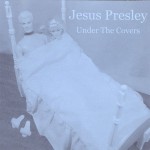 Jesus Presley
Jesus Presley
Under The Covers
JPX Productions
After six years treading the local pines, there are only three founding members left from the original twelve apostles, Reverend Tony Hughes leading the now-eight piece ensemble through its paces. This outing finds the Presleys navigating through six cover songs, including Cole Porter’s “Let’s Misbehave,” Johnny Cash’s “Ring Of Fire,” the Tubes’ “Don’t Touch Me There” and Jimi Hendrix’ “Fire. Some of the songs have been longtime staples among the band’s sets. Others are relatively new to the repertoire, but several stand out as being among the best performances the band has ever compiled.
“Fever, ” a chestnut made popular by Peggy Lee in the ‘50s, receives royal treatment. A smoldering horn section comprised of saxman John Leubner (who doubles his part) and trumpeteers Dave Monnie and James Gregg, burns its way through the arrangement. Hughes and Michelle Anderson share the vocal duties creating a febrile mood. Leubner’s smoking solo caps off the whole affair quite nicely.
But even more exotic and adventurous is the band’s crazy interpretation of the June Carter composition, “Ring Of Fire,” which more closely resembles a rendition of the ‘40s tune “Temptation.” Rich Landar’s Latin flavored piano filigrees play against drummer Jason Mockley’s slamming syncopation. Against that sax and horns play a modification of the horn charts on Johnny Cash’s original version. Over this Hughes croons seductively. Very hip.
“Fire” cruises along at a brisk clip not departing a great deal from the original in any way other than the instrumentation. “Don’t Touch Me There” too is faithful to its predecessor, a tongue-in-cheek sendup, a put-on of Meatloaf’s JIm Steinman operas, dedicated to adolescent hormonal overstimulation.
Jesus Presley have managed to survive the Cocktail Swing movement with which they were always unjustly associated. More accurately they seem to embody many of the loony comedic traits that the Spike Jones Orchestra developed back in the ‘40s. Musically, they seem to take nothing very seriously. And in a world where thieves steal presidential elections from swindlers hoping to steal the election, their humor is a welcome respite.
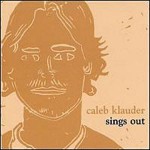 Caleb Klauder
Caleb Klauder
Sings Out
Padré Records
Caleb Klauder, one of the prime movers in Calobo had a longtime connection with wizard Luther Russell since the two had attended high school together in Northern California in 1987. Nine years later they met again when Luther’s band the Freewheelers (a band which also featured a lad named Jakob Dylan), opened a gig in Portland for Calobo. In the three years hence, the two conspired to produce this project which, like Jerry Joseph’s album, features some of the best sidemen in the Portland area.
In fact many of them are the same musicians as on Joseph’s album: namely the ubiquitous and multi-instrumental Paul Brainard and the equally adept and versatile Ian Moore— in addition to drummer Jim Bott, who did so much for the recent Mad Hattie album (see August ‘00 issue of TL); as well as ageless Stu Dodge sitting in on fiddle. And of course Luther was there to fill the role Pete Droge plays for Jerry Joseph; plugging in a bass part here, organ and piano parts there; a Wurli in the turn-around, a glockenspiel in the chorus. And in that regard, Luther might be superior to Droge. Luther is a great producer.
“Fall Like A Man” trots out in the lead position, a prancing tune that bounds off upon Brainard’s nimble “Travis pickin’” pony guitar. Klauder’s affable vocal style unravels a tale about a Nowhere Man for the Aquarian Age. “Joseph” calls to mind the work of the great Austin-based Americana band, the Gourds— a straight-forward churner, with Caleb’s direct, slightly Cowboy-tinged vocal technique.
“Long Way For The Runnin’” maintains a classic Neil Young “Southern Man’/”Cowgirl In The Sand” sense of bravado and bluster in Luther’s fiery electric guitar passages. Caleb’s vocal with harmony singer Darrin Craig on Ira and Charlie Louvin’s “If I Could Only Win Your Love” is much closer to its traditional Country roots than the version the Everly Brothers released over forty years ago.
The gentle stroll of ”Rainy Day” echoes John Lennon’s Double Fantasy period material. “Been On The Rocks,” with its energetic Stu Dodge fiddle and Peter Schwimmer banjo, is a downhome Country hoedown, gospel shoutout of the highest order. Unusual instrumentation (Mike Coykendall’s autoharp) and stalwart playing by Russell on several instruments lends “Marble Street” a sense of urgency.
A Pop sensibility drives “What I Do,” but Brainard’s slippery pedal steel guitar sends the song in one direction; while Luther’s glockenspiel and Brainard’s trumpet solo take it in quite another. Sort of like Harry Nilsson for the Starbuck’s set. Different, to be sure. “Compromise” is a gentle waltz, similar to Neil Young’s “Helpless” from his CSNY days.
Caleb Klauder displays a knack for a variety of styles. Luther Russell expertly helps to flesh out Caleb’s musical ideas with the implementation of a minimum of instrumentation. Combined, the two have created a very pleasant album full of positivity and altruism.
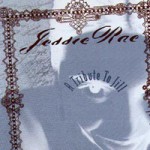 Jessie Rae
Jessie Rae
A Tribute To Jill
Jessie Rae Records
Bassist/songwriter Joan Meyer has a vocal delivery somewhat similar to that of Chrissie Hynde (or more currently, perhaps Aimee Mann), but manages to take her music in decidedly different directions from Hynde, incorporating elements of Jazz and Folk into her presentation. Here, along with Lauren Semler on guitar and Jeffrey Graham on drums, she carves a niche for herself and her band.
“Something I Said” is a shimmering piece of work, that captures a sort of Roxy Music feel and appends it to a catchy Pop song. “Laced With Sugar” reaches for a mood similar to those devised by Kate Bush, with a “yiyiyi-yihi.” “Safe And Warm” ricochets with an upstroke Reggae rhythm and a rubbery syncopated bassline and a memorable melody, slightly reminiscent to Matthew Wilder’s “Break My Stride.” Very nice. Sounding something like the work of early Heather Nova, “Think Twice” reverberates with incandescent warmth.
Joan Meyer displays a knack for unique combinations of sounds in association with heartfelt songs. While her productions are fairly bareboned, there is strength and sinew in her music.
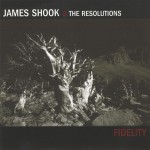 James Shook & The Resolutions
James Shook & The Resolutions
Fidelity
Self-Produced
Here’s a new, bright young talent on the scene, another multi-instrumentalist, Shook occasionally plays bass, adds a lot of guitars or keys to his songs, as well as singing in a soulfully fluid voice. Through the course of this nine song debut, Shook alternates between utilizing the services of three different drummers, as well as bassist Ben Olson and keyboardist John Etzel.
James seems comfortable as a vocalist in any genre from the Stevie Wonder soul of “February” to the Marley-imbued patois of “Heavy Token” and “Real Eyes.” From the boyish charm of “Feel Of Nothing,” to the shuffling Funk whine of “Shocking, ” the drawl of “Even Trying Blues,” to the Zydeco gumbo of “Wild And Dying Out” and the Gospel joy of “Promise.” His smooth, silky vocal delivery is the finest to be heard in these parts since Andy Stokes and Cool’r left the local scene.
Every song is as sure and true to its mark as it could be. Shook’s remarkable gift for vocal expression makes of each song a distinct and powerful treasure. There is not a bad track here. Though simply produced, recorded on a lone eight-track analog tape deck, each song is invested with tremendous depth of musical character.
By far the most exciting prospect to appear in Portland in 2000, one would be remiss to pass up any opportunity to avail themselves of a performance by James Shook & the Resolutions. This recording would seem to be an excellent primer for the uninitiated, or those unable to locate the group anywhere else. Excellent!
